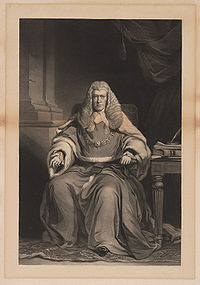Sir Frederick Pollock, 1st Baronet
Sir Frederick Pollock, Bt | |
|---|---|
 | |
| Attorney General | |
| In office 17 December 1834 – 8 April 1835 | |
| Monarch | William IV |
| Prime Minister | Sir Robert Peel, Bt |
| In office 6 September 1841 – 15 April 1844 | |
| Monarch | Victoria |
| Prime Minister | Sir Robert Peel, Bt |
| Personal details | |
| Born | 23 September 1783 Charing Cross, London |
| Died | 28 August 1870 (aged 86) |
| Nationality | British |
| Political party | Tory |
| Alma mater | Trinity College, Cambridge |
Sir Jonathan Frederick Pollock, 1st Baronet, PC (23 September 1783 – 28 August 1870) was a British lawyer and Tory politician.
Background and education
Pollock was the son of David Pollock, of Charing Cross, London, and the elder brother of Field Marshal Sir George Pollock, 1st Baronet. He was educated at St Paul's School and Trinity College, Cambridge.[1] He was Senior Wrangler at Cambridge University. He is also thought to be one of the founding members of the Cambridge Union Society, along with Henry Bickersteth and Sir Edward Hall Alderson, both of Gonville and Caius College.
Political, legal and mathematical careers
Pollock was Member of Parliament (MP) for Huntingdon from 1831 to 1844. He served as Attorney General between 1834 and 1835 and 1841 and 1844 in the Tory administrations of Sir Robert Peel. In 1841 he was admitted to the Privy Council and appointed Lord Chief Baron of the Exchequer, a post he held until 1868. Having been knighted on 29 December 1834,[2] Pollock was created a Baronet, of Hatton in the County of Middlesex, on 2 August 1866.[3] Apart from his political and legal career Pollock was elected a Fellow of the Royal Society in 1816. He contributed a number of papers in mathematics to the Royal Society, including one on what is now known as the Pollock's conjecture.
Family
Pollock died in August 1870, aged 84, and was succeeded in the baronetcy by his eldest son, William. Two of his grandsons also became prominent lawyers. Sir Frederick Pollock, 3rd Baronet, was Professor of Jurisprudence at the University of Oxford and Ernest Pollock, 1st Viscount Hanworth, served as Master of the Rolls.
References
- ^ "Pollock, Jonathan Frederick (PLK802JF)". A Cambridge Alumni Database. University of Cambridge.
- ^ "No. 19237". The London Gazette. 6 February 1935.
- ^ "No. 23143". The London Gazette. 24 July 1866.
External links
 Works by or about Jonathan Frederick Pollock at Wikisource
Works by or about Jonathan Frederick Pollock at Wikisource
- Use dmy dates from June 2012
- 1783 births
- 1870 deaths
- Baronets in the Baronetage of the United Kingdom
- Attorneys General for England and Wales
- Chief Barons of the Exchequer
- Members of the Parliament of the United Kingdom for English constituencies
- UK MPs 1831–32
- UK MPs 1832–35
- UK MPs 1835–37
- UK MPs 1837–41
- UK MPs 1841–47
- Fellows of the Royal Society
- Alumni of Trinity College, Cambridge
- Senior Wranglers
